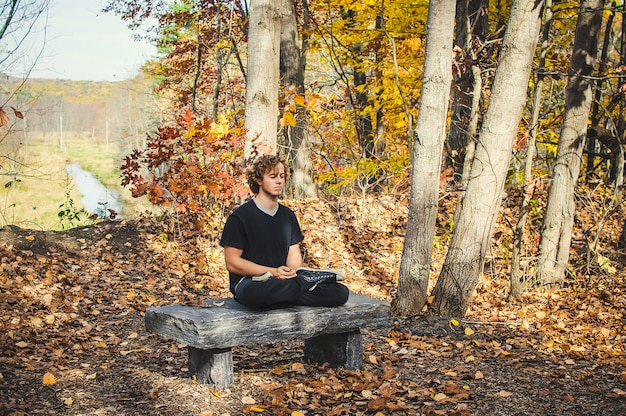Mindfulness for Men: Reduce Anxiety in 15 Minutes a Day

Mindfulness for men can significantly reduce anxiety levels with just 15 minutes of daily practice by fostering present moment awareness and emotional regulation.
Are you a man feeling overwhelmed by anxiety? Discover how incorporating mindfulness for men into your daily routine, specifically just 15 minutes a day, can significantly reduce your anxiety levels and improve your overall well-being.
The Rising Stress Levels Faced by Men Today
Modern life often throws a barrage of stressors at men. From career pressures and financial worries to relationship challenges and societal expectations, the cumulative effect can lead to heightened anxiety. Recognizing these stressors is the first step toward managing them effectively.
In today’s fast-paced society, men often feel pressured to succeed, provide, and remain strong. This constant pressure can manifest as anxiety, impacting their mental and physical health. The stigma around mental health can also prevent men from seeking help, exacerbating the problem.
Common Stressors Affecting Men
Identifying the specific stressors is crucial for targeted intervention. These stressors can broadly be classified into several key areas:
- Work-Related Pressures: Long hours, job insecurity, and high expectations lead to chronic stress.
- Financial Burdens: Managing debt, mortgages, and providing for families contribute to significant anxiety.
- Relationship Issues: Conflicts with partners, family members, or friends can create emotional turmoil.
- Societal Expectations: The pressure to conform to traditional masculine roles amplifies stress.
These stressors, if unaddressed, can lead to a cascade of negative effects, including increased anxiety, depression, and physical health problems. Therefore, proactive strategies are essential for managing stress and maintaining well-being.
Understanding the prevalence and impact of these stressors is crucial for destigmatizing mental health issues and encouraging men to seek support. Mindfulness offers a practical, accessible, and evidence-based approach to managing anxiety and stress.
What is Mindfulness, Exactly?
Mindfulness for men, at its core, is the practice of intentionally focusing on the present moment without judgment. It involves paying attention to your thoughts, feelings, and sensations as they arise, without getting carried away by them.
Originating from ancient Buddhist traditions, mindfulness has been adapted into a secular practice widely used for stress reduction and mental well-being. It’s about being fully present and engaged in whatever you’re doing, right now.
The Key Components of Mindfulness
Mindfulness encompasses several key elements that contribute to its effectiveness. Understanding these components can help you integrate mindfulness into your daily life more meaningfully:
- Present Moment Awareness: Focusing your attention on the here and now, rather than dwelling on the past or worrying about the future.
- Non-Judgment: Observing your thoughts and feelings without labeling them as good or bad, right or wrong.
- Acceptance: Acknowledging your experiences as they are, without trying to change or resist them.
- Compassion: Treating yourself with kindness and understanding, especially during difficult times.
Mindfulness isn’t about emptying your mind or achieving a state of constant bliss. Instead, it’s about developing a greater awareness of your internal landscape and learning to respond to it with wisdom and kindness.
This practice allows men to gain control over their emotional responses and reduce the impact of stress on their mental health. Regular mindfulness practice can lead to increased self-awareness, emotional regulation, and overall well-being.

The Science-Backed Benefits of Mindfulness for Anxiety Reduction
The benefits of mindfulness extend beyond anecdotal evidence; numerous scientific studies have demonstrated its effectiveness in reducing anxiety. These studies provide compelling evidence of how mindfulness can positively impact mental well-being.
Research indicates that regular mindfulness practice can alter brain structure and function, particularly in areas associated with stress and emotional regulation. This neuroplasticity contributes to long-term improvements in mental health.
Scientific Findings on Mindfulness and Anxiety
Several key findings highlight the impact of mindfulness on anxiety:
- Reduced Amygdala Activity: Mindfulness has been shown to decrease activity in the amygdala, the brain’s fear center.
- Increased Prefrontal Cortex Activity: It also enhances activity in the prefrontal cortex, which is responsible for executive functions like decision-making and emotional regulation.
- Improved Stress Hormone Levels: Mindfulness can lower levels of cortisol, the stress hormone, leading to a greater sense of calm.
These physiological changes translate into tangible benefits, such as reduced anxiety symptoms, improved sleep quality, and enhanced focus. Incorporating mindfulness into your daily routine can lead to significant improvements in your mental and physical health.
By understanding the scientific basis of mindfulness, men can feel more confident in adopting this practice as a tool for managing anxiety and enhancing their overall well-being.
How to Incorporate Mindfulness into Your Daily Routine in Just 15 Minutes
Integrating mindfulness into your daily routine doesn’t require extensive time commitments. In fact, just 15 minutes of mindfulness practice can yield significant benefits. Here are some strategies to help you get started.
Starting small and gradually increasing the duration of your mindfulness practice is key. Consistency is more important than the length of each session. Even a few minutes of mindfulness each day can make a difference.

Practical Mindfulness Exercises for Men
Here are some actionable steps with the description:
- Start with Guided Meditations: Use mindfulness apps or online resources to guide your practice. These meditations often focus on breath awareness, body scan techniques, or loving-kindness meditations.
- Practice Mindful Breathing: Dedicate a few minutes each day to focusing on your breath. Notice the sensation of each inhale and exhale without trying to change it.
- Engage in Mindful Activities: Bring mindfulness to everyday tasks, such as eating, walking, or washing dishes. Pay attention to the sensory details and engage fully in the activity.
- Use Mindfulness to Navigate Stressful Situations: When you feel anxiety arising, pause and take a few deep breaths. Observe your thoughts and feelings without judgment, and then choose how to respond.
These techniques can be easily integrated into your daily life. Mindfulness is a skill that improves with practice, so be patient with yourself and celebrate your progress along the way.
Remember, the goal is not to eliminate anxiety entirely, but to develop a greater awareness of your emotional state and learn to respond to it with resilience and compassion.
Mindfulness Techniques Tailored for Men’s Needs
While mindfulness is beneficial for everyone, certain techniques may resonate more with men. These tailored approaches address common challenges men face, such as difficulty expressing emotions and the pressure to remain stoic.
Modifying traditional mindfulness practices to suit men’s preferences can enhance their engagement and effectiveness. These adaptations may include focusing on physical sensations, incorporating movement, or using different language.
Mindfulness Practices for Mental Wellness
Some popular practices for men’s mental wellness are:
- Body Scan Meditations: Focus on physical sensations in different parts of your body. This can help increase body awareness and reduce physical tension.
- Walking Meditations: Combine physical activity with mindfulness. Pay attention to the sensation of your feet making contact with the ground and your body moving through space.
- Gratitude Practices: Take time each day to reflect on what you are grateful for. This can shift your focus away from negative thoughts and promote a sense of well-being.
These adjustments make mindfulness more accessible and applicable to the specific challenges men face. By tailoring mindfulness techniques to men’s needs, it becomes a more effective tool for managing anxiety and improving mental health.
Finding what works best for you is key. Experiment with different techniques and adapt them to fit your lifestyle and preferences. Consistency is more important than strict adherence to any one method.
Overcoming Common Challenges in Starting a Mindfulness Practice
Starting a mindfulness practice can come with its own set of challenges. Many men struggle to quiet their minds, find the time, or overcome skepticism. Recognizing these challenges is the first step in overcoming them.
Addressing common barriers, such as perceived lack of time, discomfort with introspection, and misconceptions about mindfulness, can help men successfully integrate this practice into their lives.
Tips for Overcoming Common Obstacles
Here are some steps toward overcoming challenges:
- Start Small: Begin with just a few minutes of mindfulness each day. Gradually increase the duration as you become more comfortable.
- Find a Quiet Space: Create a dedicated space where you can practice mindfulness without interruptions.
- Be Patient: It takes time to develop mindfulness skills. Don’t get discouraged if you don’t see results immediately.
- Seek Support: Join a mindfulness group or work with a qualified teacher to help you stay motivated and on track.
By addressing these challenges head-on, men can successfully incorporate mindfulness into their lives and experience its many benefits. Mindfulness is a skill that improves with practice, so be patient and persistent.
With dedication and perseverance, anyone can overcome these obstacles and harness the power of mindfulness to enhance their mental and emotional well-being. Remember that mindfulness is a journey, not a destination.
| Key Point | Brief Description |
|---|---|
| 🧘 Daily Practice | 15 minutes of daily mindfulness reduces anxiety. |
| 🧠 Mental Benefits | Improves focus, emotional regulation, and stress response. |
| 💪 Tailored Techniques | Body scans, walking meditations, and gratitude practices for men. |
| 🎯 Overcoming Challenges | Start small, seek support, and be patient with progress. |
Frequently Asked Questions
▼
Mindfulness is the practice of focusing on the present moment without judgment. For men, it helps reduce anxiety by promoting emotional regulation and increasing self-awareness, leading to a calmer and more centered state of mind.
▼
Just 15 minutes of daily mindfulness practice can yield significant benefits in reducing anxiety levels. Consistency is more important than duration, so start with a manageable time and gradually increase as comfort grows.
▼
Effective techniques for men include body scan meditations, walking meditations, and gratitude practices. These techniques focus on physical sensations and promote a sense of well-being, addressing common challenges men face.
▼
To overcome challenges, start small with short sessions, create a quiet space, be patient with progress, and seek support from mindfulness groups or qualified instructors. Remember that practice improves with time.
▼
Yes, numerous studies show that mindfulness reduces anxiety. It lowers activity in the brain’s fear center, increases activity in the prefrontal cortex (emotional regulation), and reduces stress hormone levels for a calmer state.
Conclusion
Incorporating mindfulness for men into your daily life, even for just 15 minutes, can be a transformative step toward reducing anxiety and enhancing overall well-being by integrating mindful practices and tailoring techniques to individual needs, men can unlock the numerous benefits of mindfulness and cultivate a more balanced and resilient life.





